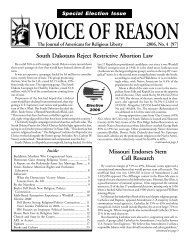The Importance of Church-State Separation - Americans for ...
The Importance of Church-State Separation - Americans for ...
The Importance of Church-State Separation - Americans for ...
You also want an ePaper? Increase the reach of your titles
YUMPU automatically turns print PDFs into web optimized ePapers that Google loves.
12<br />
<strong>of</strong>ficials to contact students one-on-one in cafeterias and hallways,<br />
volunteering as unpaid teaching aides, and using substance abuse lectures<br />
or assemblies to gain access to students. It is not uncommon <strong>for</strong><br />
these activities to have the approval <strong>of</strong> local school authorities. Needless<br />
to say, these operations tend to take place more <strong>of</strong>ten in smaller,<br />
more religiously homogeneous communities than in larger, more pluralistic<br />
ones.<br />
Religious music in the public school curriculum, in student concerts<br />
and theatrical productions, and at graduation ceremonies has long been<br />
a thorny issue. As Secretary Riley’s 1995 and 1998 guidelines and<br />
court rulings have made clear, schools may <strong>of</strong>fer instruction about religion,<br />
but they must remain religiously neutral and may not <strong>for</strong>mally<br />
celebrate religious special days. What, then, about religious music, which<br />
looms large in the history <strong>of</strong> music?<br />
<strong>The</strong>re should be no objection to the inclusion <strong>of</strong> religious music in<br />
the academic study <strong>of</strong> music and in vocal and instrumental per<strong>for</strong>mances,<br />
as long as the pieces are selected primarily <strong>for</strong> their musical<br />
or historical value, as long as the program is not predominantly religious,<br />
and as long as the principal purpose and effect <strong>of</strong> the inclusion is<br />
secular. Thus there should be no objection to inclusion in a school production<br />
<strong>of</strong> religious music by Bach or Aaron Copland’s arrangement <strong>of</strong><br />
such nineteenth-century songs as “Simple Gifts” or “Let Us Gather by<br />
the River.” What constitutes “musical or historical value” is, <strong>of</strong> course,<br />
a matter <strong>of</strong> judgment and controversy among musicians and scholars,<br />
so there can be no simple <strong>for</strong>mula <strong>for</strong> resolving all conflicts.<br />
Certain activities should clearly be prohibited. Public school choral<br />
or instrumental ensembles should not be used to provide music <strong>for</strong><br />
church services or celebrations, though a school ensemble might per<strong>for</strong>m<br />
a secular music program in a church or synagogue as part <strong>of</strong> that<br />
congregation’s series <strong>of</strong> secular concerts open to the public and not<br />
held in conjunction with a worship service. Hymns should not be included<br />
in graduation ceremonies. Students enrolled in music programs<br />
<strong>for</strong> credit should not be compelled to participate in per<strong>for</strong>mances that<br />
are not primarily religiously neutral.<br />
As <strong>for</strong> teaching about religion, while one can agree with the Supreme<br />
Court that public schools may, and perhaps should, alleviate<br />
ignorance in this area in a fair, balanced, objective, neutral, academic<br />
way, getting from theory to practice is far from easy. <strong>The</strong> difficulties<br />
should be obvious. Teachers are very seldom adequately trained to<br />
teach about religion. <strong>The</strong>re are no really suitable textbooks on the mar-



